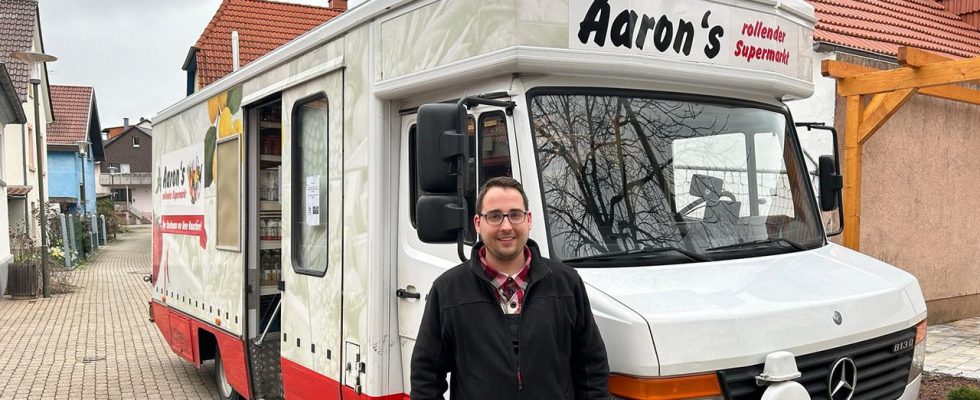Many people are drawn to rural areas. But there are also many towns in the countryside that are fighting for their future and feel left behind. How can they be strengthened?
Aaron Daubner runs a kind of rolling supermarket. Newspapers, bread, fruit, canned goods and chocolate Easter bunnies – all in a small truck. Every day he drives out into the countryside to the communities around Pforzheim, where the houses are getting older and many of the shutters are closed. To where the town center is slowly dying out and the supermarket is missing.
No more shops anywhere
Daubner’s first stop today: Bretten-Ruit, around 1,500 inhabitants. Older customers in particular who are no longer mobile do their entire weekly shopping with him because there are no stores left anywhere in the area. “Older people in rural areas feel totally forgotten and neglected,” says the 25-year-old. His customers talk about the “golden times” when Ruit still had his own shop, post office and banks. Now even the ATM has disappeared. There is no doctor’s office or pharmacy. “It’s all gone,” says an older customer, “it feels like shit.”
Of course, Daubner benefits from the needs here in the country with his rolling supermarket. Nevertheless, he is worried about the future of the villages. “Those who could break something move away because of work or other things. And ultimately only the old people remain.”
In Mehrstetten, the citizens are getting involved
The citizens of Mehrstetten (Reutlingen district) in the Swabian Alb do not seem to have these concerns. Around 1,500 people live here too. The town has a primary school with all-day care, a bank, a post office and a fiber optic connection. When the last store closed a few years ago for reasons of age, the next one opened right in the center of town with an attached café. The new village shop belongs to the cooperative members and the citizens of Mehrstetten, many of whom volunteer here.
Weak communities can benefit from strong neighbors.
Why do rural communities develop so differently? In Baden-Württemberg or, for example, in large parts of Bavaria, there are no large-scale isolated regions, says Jörn Birkmann from the Institute for Spatial Planning and Development Planning at the University of Stuttgart. “There are individual communities that are developing significantly below average.” There could be another community right next door that is currently booming.
The reasons for this are very different. For example, one municipality has a university nearby and attracts young people. Another municipality is dependent on a specific industry and may be experiencing structural change. But Birkmann also sees this as an opportunity: a structurally weak community could benefit from the booming community next door if both work more closely together. State governments could create incentives so that such cooperation is mutually beneficial.
Some areas need a regional strategy
Things are different when larger areas are affected. Especially in many eastern German federal states, but also in parts of North Rhine-Westphalia, Rhineland-Palatinate or Northern Bavaria, it happens that five to ten communities in a rural region are all developing below average. For example, qualified workers are emigrating there, the population is aging and unemployment is often higher.
In such cases, politics must also promote cooperation between municipalities, but Birkmann also says “a larger concept is needed. The entire region must be strengthened.” Educational offerings such as universities would have to be specifically created and businesses would have to be located. In addition, the places would have to be made more attractive again, for example by reviving old industrial buildings, renovating the train station and making the town center lively. This attracts young people and skilled workers back to the region.
“We are left alone as a community”
Markus Giesa (Free Voters) from the local council in Trichtingen near Rottweil would like more support: “We are left alone as a community. We are given new regulations and have to implement them.” For example, he was shocked because the local primary school was to be closed. The small community cannot meet the state government’s requirements with all-day care and a large cafeteria. The local council therefore decided to close it for financial reasons.
In Trichtingen, many residents are frustrated. There isn’t even a mobile supermarket here. Restaurants and shops are closed. “When you look at where you come from with an intact village, you really get scared. Where is the village heading?” Giesa asks herself.
Regional strategy: If localities are revitalized, young people will come back to the region.
Many things work out, but wishes remain
Many citizens say that there is still room for improvement in Mehrstetten on the Alb. The bus, for example, runs extremely rarely and more industry could settle there. But Christiane Striebel, who recently became a mother for the second time, enjoys life here and wants to stay in Mehrstetten. “The community has invested a lot, for example in the kindergarten,” says the young mother, “there are many opportunities for shopping and the doctor is nearby.” She hopes that her youngest child, Luca, will one day also become actively involved in village life.

